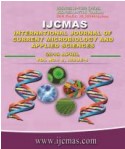


 National Academy of Agricultural Sciences (NAAS)
National Academy of Agricultural Sciences (NAAS)

|
PRINT ISSN : 2319-7692
Online ISSN : 2319-7706 Issues : 12 per year Publisher : Excellent Publishers Email : editorijcmas@gmail.com / submit@ijcmas.com Editor-in-chief: Dr.M.Prakash Index Copernicus ICV 2018: 95.39 NAAS RATING 2020: 5.38 |
The study was conducted to examine the effects of CT from Ficus benghalensis leaves on the feed utilization and health status of kids. Twenty-one Surti kids (4-5 month; 13.04±1.12 kg BW) were divided into three homogenous groups CON (dewormed), PAR (naturally parasitized) and PAR-TAN (naturally parasitized with dietary inclusion of tanniferous leaves). The kids of CON and PAR were maintained in a basal diet, while that of PAR-TAN group were fed a diet containing Ficus benghalensis leaves to supply 1.5% condensed tannin (CT). Blood was collected on at equal intervals (0, 35 and 70 day) to assess the important blood metabolite, hematology and erythrocytic antioxidant status. Immune status was verified against chicken erythrocyte after one month of experimental period. The total body weight gain and ADG for a period of 70 days not showed a significant (P < 0.05) difference by the supplementation of CT at 1.5% through F.bengalensis leaves. Also, addition of CT up to 1.5% in the supplement did not interfere with the digestibility of DM, OM, CP, EE, NDF and ADF by kids. Digestible crude protein (DCP) and total digestible nutrients (TDN) values of the composite diets were comparable between the different dietary groups. There was improvement (P<0.05) in erythrocytic antioxidant status in the CT supplemented groups evident from increased concentrations of reduced glutathione groups concomitant to a reduction in lipid peroxidation as compared to the control. Feeding of CT containing diets up to 1.5 % level significantly (P<0.05) decreased the faecal egg counts when compared with the PAR group. It may be concluded that tree leaves of Ficus benghalensis (containing 1.5 % CT) has the potential to improve antioxidant status with an apparent negative impact on GI nematodes in kids.
 |
 |
 |
 |
 |